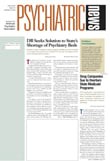People who are victimized because of their race share an unfortunate legacy with victims of terrorism. Both suffer the effects of violence inflicted on them because of factors beyond their control—effects that are often both severe and chronic.
This is the contention of Chalsa Loo, Ph.D., a clinical research psychologist at the National Center for Post-Traumatic Stress Disorder’s Pacific Islands Division. The center is a project of the Department of Veterans Affairs.
Loo, who maintains that race-based violence is a form of terrorism, discussed this issue at the annual convention and scientific assembly of the National Medical Association, the country’s largest organization of African-American physicians, in August in Honolulu. She presented findings of a study on race-related stressors and posttraumatic stress disorder (PTSD).
Loo has written extensively on mental health issues pertaining to Asian Americans. For her study she administered the Race-Related Stress Scale (RRSS) to 300 Asian-American veterans who served in the U.S. military during the Vietnam War. She hypothesized that these soldiers, who, being of Asian ethnicity, bore a substantial physical resemblance to the enemy the United States was fighting in Vietnam, would suffer from PTSD in numbers over those predicted by military rank and extent of combat exposure.
Loo noted that when she began her study, there was no published research on the existence of a relationship between race-related stressors and PTSD symptoms or even on racism as a traumatic stressor. There had been studies, however, that uncovered higher PTSD prevalence rates and adjustment problems among African-American and Hispanic veterans than among their white counterparts. Loo wanted to see whether race-related discrimination while in the military could be a shown to be a “distinct contributing factor” to psychological problems after veterans left the service.
The measurement instrument they used, the RRSS, of which Loo was one of the developers, contains a series of questions that respondents rank on a five-point scale. The scale’s questions assess three categories of race-related stressors.
The first, having experienced racial prejudice and stigmatization, asked the Asian-American veterans about perceived racial slurs, racial hatred, or “being treated like outsiders or foreigners” while in the military.
The second category, bicultural identification and conflicts, assessed the degree to which the veterans identified with the Vietnamese people or culture while stationed in their country. Loo expected this section would reveal conflicts between the extent to which veterans identified with the North Vietnamese and “military conditioning to dehumanize the enemy.”
Experiencing a racist environment while in the military was the third category of question. She explained that this section dealt with the Asian-American veterans having heard remarks or seen behavior on the part of U.S. military personnel that denigrated or harassed Asians.
Participants’ race/ethnicity was Chinese, Filipino, Korean, Japanese, Chamorro, mixed Asian, or mixed Asian and non-Asian. Seventy percent were in the Army, the rest in the other branches of the military.
The data showed that 20 percent of the variance in PTSD incidence in this population of Vietnam veterans was due to race-related stressors, Loo said—that is, with military rank and combat exposure factored out.
Both total RRSS score and having experienced racial prejudice and stigmatization were even stronger predictors of PTSD symptomatology than exposure to combat, Loo pointed out.
She noted that her findings on the relationship of racism and PTSD are in line with those of studies done in the mid-1980s that showed that African-American Vietnam veterans showed more psychological problems and adjustment difficulties than Caucasian soldiers. She suggested that a major factor in the postwar problems experienced by African-American veterans may have arisen from guilt and rage related to emotionally identifying with the “devalued” and oppressed Vietnamese people they were fighting.
“This finding tells us that the personal experience of racism is a potent risk factor for PTSD,” she stated, and one to which clinicians and researchers have rarely paid attention.
The message for psychiatrists, Loo suggested, is that clinicians who fail to account for and discuss possible race-related stressors with their non-Caucasian patients are potentially missing a major cause of PTSD symptoms. ▪
